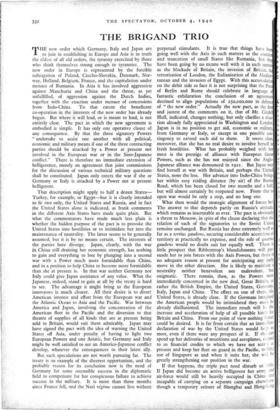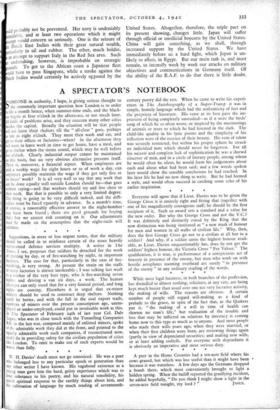THE BRIGAND TRIO
THE new order which Germany, Italy and Japan are to join in establishing in Europe and Asia is in truth the oldest of all old orders, the tyranny exercised by those who think themselves strong enough to tyrannise. The new order in Europe is represented by the forcible subjugation of Poland, Czecho-Slovakia, Denmark, Nor- way, Holland, Belgium, France, and the capitulation under menace of Rumania. In Asia it has involved aggression against Manchuria and China and the threat, as yet unfulfilled, of aggression against the Dutch Indies, together with the exaction under menace of concessions from Indo-China. To that extent the beneficent co-operation in the interests of the new order has already begun. But where it will lead, or is meant to lead, is not entirely clear. The pact in which the new agreement is embodied is simple. It has only one operative clause of any consequence. By that the three signatory Powers " undertake to assist one another with all political, economic and military means if one of the three contracting parties should be attacked by a Power at present not involved in the European war or in the Sino-Japanese conflict." There is therefore no immediate extension of belligerence, merely an agreement that joint commissions for the discussion of various technical military questions shall be constituted. Japan only enters the war if she or Germany or Italy is attacked by a Power not at present belligerent.
That description might apply to half a dozen States— Turkey, for example, or Egypt—but it is clearly intended to fit two only, the United States and Russia, and in fact the United States alone is indicated, as frank comments in the different Axis States have made quite plain. But what the commentators have made much less plain is whether the hidden purpose of the pact is to provoke the United States into hostilities or to intimidate her into the maintenance of neutrality. The latter seems to be generally assumed, but it is by no means certain. The interests of the parties here diverge. Japan, clearly, with the war in China still draining her economic strength, has nothing to gain and everything to lose by plunging into a second war with a Power much more formidable than China, and in a position to help China to become more formidable than she at present is. In that war neither Germany nor Italy could give Japan assistance of any value. What the Japanese, indeed, stand to gain at all by the treaty is hard to see. The advantage it might bring to the European innovators is much clearer. All their desire is to divert American interest and effort from the European war and the Atlantic Ocean to Asia and the Pacific. War between America and Japan, involving the concentration of the American fleet in the Pacific and the diversion to that theatre of supplies of all kinds that are at present being sold to Britain, would suit them admirably. Japan may have signed the pact with the idea of warning the United States off Asia, under penalty of having to fight two European Powers and one Asiatic, but Germany and Italy might be well satisfied to see an Americo-Japanese conflict develop, whatever the consequences to their latest ally.
But such speculations are not worth pursuing far. The treaty is an example of the sheerest opportunism, and the probable reason for its conclusion now is the need of Germany for some ostensible success in the diplomatic field to compensate for her conspicuous failure to achieve success in the military. It is more than three months since France fell, and the Nazi regime cannot live without perpetual stimulants. It is true that things have been going well with the Axis in such matters as the coercion and truncation of small States like Rumania, but they have been going by no means well with it in such matter[ as the blockade of Britain, the invasion of Britain, the terrorisation of London, the Italianisation of the Aleciiter• ranean and the invasion of Egypt. With this accumulation on the debit side to face it is not surprising that the Press of. Berlin and Rome should celebrate in language of fantastic exhilaration the conclusion of an agreement destined to align populations of 250,000,000 in defence of " the new order." Actually the new pact, as the first and justest of the comments on it, that of Mr. Cordell Hull, indicated, changes nothing, but only clarifies a situa tion already fully appreciated in Washington and London. Japan is in no position to get aid, economic or military, from Germany or Italy, or except in one possible con- tingency to extend such aid to them. It seems clear, moreover, that she has no real desire to involve herself in fresh hostilities. What has probably weighed with her most is the prestige of alliance with European Great Powers, such as she has not enjoyed since the Anglo- Japanese alliance was denounced in 1921. But Japan may find herself at war with Britain, and perhaps the United States, none the less. Her advance into Indo-China brings her within easy raiding distance (by air) of the Burma Road, which has been closed for two months and a half, but will almost certainly be reopened now. From that to open war would be only a step, and no long one.
What then would the strategic alignment of forces be? The answer. to that depends partly on Russia's attitude, which remains as inscrutable as ever. The pact is obviously a threat to Moscow, in spite of the clause declaring that the relation of each of the signatories to the Soviet Union remains unchanged. But Russia has done extremely well so far as a tertius gaudens, securing considerable accessions of territory at practically no expense, and the role of quartos gaudens would no doubt suit her equally well. There Is little prospect that Ribbentrop's blandishments will per- suade her to join forces with the Axis Powers, but there iq no adequate reason at present for anticipating any early move in the other direction. She is likely to maintain a neutrality neither benevolent nor malevolent, but enigmatic. There remain, then, as the Powers most immediately concerned in the new deal, Great Britain, or rather the British Empire, the United States, Germany, Italy, Japan and China. The effect on one of them. the United States, is already clear. If the Germans imagined the American people would be intimidated they mii,t br already disillusioned. The immediate result will b. the increase and acceleration of help of all possible kin-!, for Britain and China. From our point of view nothing 1-Jter could be desired. It is far from certain that an imin-31at" declaration of war by the United States would he pus most, even if there were any prospect of it. If sh: can speed up her deliveries of munitions and aeroplanes, e- ,=110. to us financial credits to which we have not acce present and keep her fleet on guard, in the Pacific, m use of Singapore as and when it suits her, she wl greatly strengthening our position in the war.
If that happens, the triple pact need disturb us ":k.1 If Japan did become an active belligerent her army -111'4 air-force would still be heavily occupied in China in- incapable of carrying on a separate campaign elsewl =re' though a temporary seizure of Shanghai and Hong-;-'n= d probably not be prevented. Her navy is undeniably rtnidable, and at least two operations which it might /tempt would concern us seriously. One is the seizure of e Dutch East Indies with their great natural wealth, .cularly in oil and rubber. The other, much bolder, an attempt to support Italy in the Red Sea area. Such undertaking, however, is improbable on strategic unds. To get to the African coast a Japanese fleet ould have to pass Singapore, while a stroke against the utch Indies would certainly be actively opposed by the United States. Altogether, therefore, the triple pact on its present showing, changes little. Japan will suffer through official or unofficial boycotts by the United States. China will gain something, as we shall, through increased support by the United States. We have immediately before us a hard fight, which Japan is un- likely to affect, in Egypt. But our main task is, and must remain, to intensify week by week our attacks on military objectives and communications in Germany itself. Of the ability of the R.A.F. to do that there is little doubt.



























 Previous page
Previous page